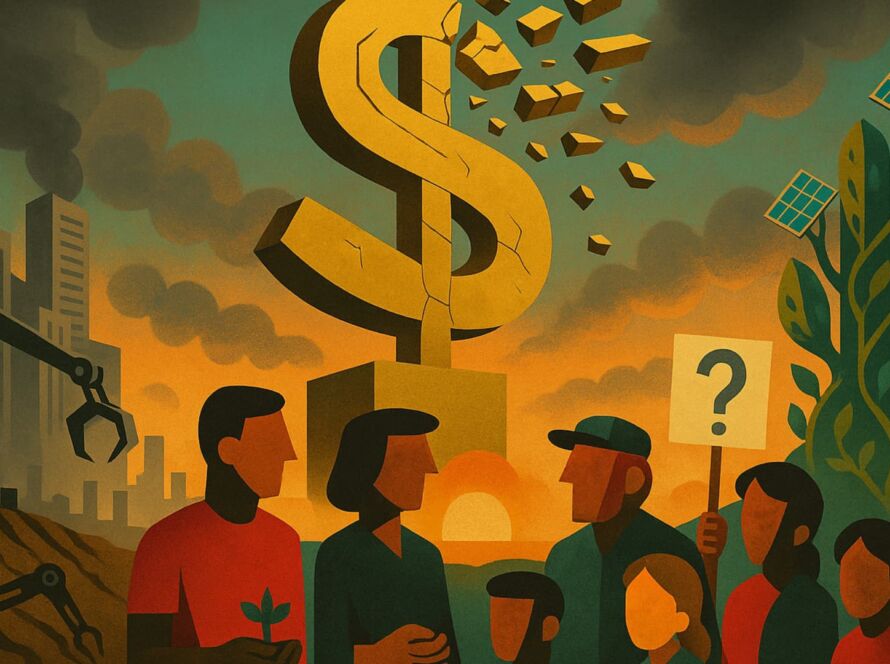My friends, I am back!
I know I disappeared for the last few weeks with no explanation whatsoever — unless you happened to visit my LinkedIn page, in which case you saw that I was traveling like a crazy person. I’ve been to Detroit, Washington D.C., Boston, and Chicago in the last few weeks. AND, two weekends ago we had a massive 2-day community garage sale happening, which took all my energy and focus. AND, last weekend I was doing belated birthday celebrations with my kiddos and partner. (My birthday is June 12; thanks for asking!)
Anyhow…!
As you know, I’ve been thinking a lot about A.I. lately; this hasn’t stopped in our time apart. Here’s the list so far, if you’ve missed any:
- My first beef with Sam Altman
- A bit about A.I. anxiety & finding purpose
- Trying to “outscore” A.I. is stupid
- Watch out, or A.I. will become a Great Distraction
- A.I. needs to help humans get released from drudgery
Fun fact: I’m not really writing all these because I “want” to. I am truly feeling compelled to write about this topic because it’s the current technology that is eating the world, and I think it’s a big part of my job to help us understand what kind of future we are creating with such a machine.
A.I. is omnipresent, un-ignorable, and really probably IS going to change our lives — but right now, I mostly sense a lot of confusion and chaos. So, I keep working to make sense of it, and the way I do that is by writing. And by sharing it with you!
During my Boston trip this last week, I had the distinct pleasure to facilitate a 2-hour session on A.I. with 30+ brilliant, high-level executives from a global pharma company — it was framed as “Leading In The Age Of A.I.” (which I am liking so much I think it will become my keynote title).
I find A.I. uniquely challenging to speak about, because there’s always a wide gamut of experience levels in the room. Some folks are Pro-level experts with subscriptions to ChatGPT, Claude, AND Gemini, and others haven’t even tried a single chat. There’s also a wide variety of technological know-how represented; some folks think the term “auto-regressive” is old news and boring and others won’t even know what “LLM” stands for.
So for me the question becomes: what will be most helpful for these executives? What do they need to hear / be aware of / understand / think about / wrestle with that they probably haven’t yet?
With some great support from the consulting team, we crafted a powerful “Lab” experience where the leaders sat in small groups and worked through 3 different mindsets / personas / metaphors that exemplify the kind of leader we need to be in the Age of A.I. — it was awesome.
But through this experience, something became clarified for me that we all need to understand…
A.I. is going to commoditize knowledge work.
You know, the kind of work a ton of us do.
The outputs of knowledge work are things like document creation, powerpoint building, and image manipulation. It’s light graphic design and stuff like drafting new logos and mocking up layouts and finding images. It’s basic legal documents and the writing of emails and articles. It’s the filling of forms and the bulleting of bullet points and the practice of prose.
These are the things that knowledge work produces.
If you’ve used a ChatGPT-like service at all, you already know that A.I. makes all these things easier by magnitudes.
What’s becoming clear to me is that it’s not just making these things easier — it is commoditizing them.
It’s similar to how we commoditized products. Over the last few decades, we perfected a globalized formula to create “things” (toys, clothes, electronics, etc.) largely by employing more inexpensive labor. This made all of our “stuff” remarkably (some would say impossibly) cheap. We might call this the “Temu Effect.” Yes, I know things are a little different at the moment with tariffs, but stick with me; we still currently live in a world where you can get almost anything you can dream of, and you can get it for a relatively minuscule cost.
This is what is coming for the outputs of knowledge work.
It is going to get cheap — probably close to free — to produce these outputs. A.I. is the “inexpensive labor” for knowledge work. And not only that, these tools are also going to be accessible to almost everyone, which means your B/C/D players are going to start to look like A players.**
All of this is noteworthy, but here’s the real kicker…
Most of the stuff that fills our days — the stuff that we think of as “work” — is in service of creating those kinds of outputs. And A.I. is coming for most of it.
Knowledge work is going to be eaten by A.I. — I’m pretty convinced it’s going to carve out the entire lower-to-middle segment of this whole category.
Which means you go… where?
You’ll have to go somewhere, and I’m pretty sure the only place you want to go is UP.
But what does UP look like?
It’s the classic question of innovation of course, not unlike humans being displaced by machines in the Industrial Revolution — it’s just that none of us alive today were around when that happened so what’s happening now feels crazy and unimaginable.
These kinds of shifts require us to evolve. But that’s good news, because evolving is something we humans are really quite adept at…!
So this time, what evolution is required of us?
I would call what’s necessary a quantum leap in human development.
As we’ve always done, we evolve to do the things only humans can do.
Which is… what, exactly?
I’m pretty sure it’s more wisdom, more imagination, more care, more empathy. More thoughtfulness. More “air traffic control.” More direction. More sense-making.
But it feels weeeeeird to think about “work” in that way, doesn’t it?? What in the WORLD would your work day look like if it was filled with those things instead of all the “knowledge work output” stuff you’re doing now?
Can you even imagine it?
I would imagine many of us can’t.
This is because, without using actual robots, we’ve been “roboticizing” work for decades. (I’m pretty sure this is also one of the reasons why engagement levels are total shit, but that will have to be a topic for another day.) Over the past years, huge portions of our daily work has become stuff we secretly wish machines would do, because it feels like a waste of our time and talents. (Or maybe we used to wish for that, before we got desensitized and numb to it. So now we just shut up and push the button.)
But a lot of that work really IS going to go to the robots, soon.
How can I be so confident about this?
Because corporate systems are dark triad entities that exist to pursue profits at almost any cost, they will work relentlessly to replace you with anything that is cheaper or faster (which is cheaper).
So, what do you do with this right now?
Don’t be paralyzed and don’t get trapped in nostalgia, just get to work on yourself!
Start imagining what your job looks like if you elevate. How can you become the sense-maker? The wisdom-bringer? How can you bring direction and insight and imagination?
Actually, if you want my best advice for what to do after reading this possibly-disturbing article, I recommend you chat about this with a GPT. Yes, really! I would copy/paste this whole post into your LLM of choice (please make sure to credit me as “Josh Allan Dykstra”) and then ask it: “What do I need to elevate myself in my role and make myself A.I.-proof?”
Really, please go do it now.
I’ll close with a quote:
“It’s not the strongest of the species that survives, nor the most intelligent, but the ones most responsive to change.” – Charles Darwin
You got this. 🧡
//
**Will this actually make B/C/D players into A players? I’m not sure yet — it likely depends on just how good the tools get — but my guess right now is it will not. Think of a hammer and chisel; the greatest tools in the world are not what makes a Michelangelo.



